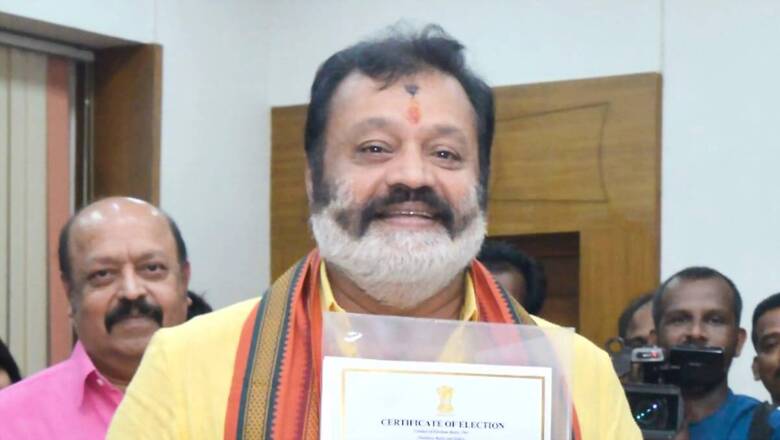
views
The result of the 2024 Lok Sabha election has raised many eyebrows in Kerala. Even though it was expected that the Congress party would outperform the left, many were in disbelief about the victory of the BJP candidate from Thrissur. Suresh Gopi, a popular Malayalam film actor and philanthropist, won the Thrissur seat by defeating the rival CPI candidate with a sizable margin of 74,686 votes. He became the first candidate to get elected to the Lok Sabha from Kerala on a Lotus symbol. The BJP also secured 19.14 per cent of the vote share in Kerala, its highest in any election till date. The left alliance won one seat, while the Congress-led United Democratic Front (UDF) won 18 out of 20 seats.
After their electoral debacle in West Bengal and Tripura, Kerala remains the last bastion of the left parties. The Left alliance came to power in Kerala in 2016, and they repeated their victory in 2021, outwitting anti-incumbency in a state known for changing governments every five years. But various allegations of scams and favouritism, cell rule, and CPIM controlling government machinery have all resulted in the rise of public sentiment against the state government. The ruling CPIM is also facing various internal issues, often resulting in a weakening of its organisational structure.
With the BJP becoming a formidable force in Kerala, it is important to analyse whether the left parties are facing an existential crisis in their last stronghold.
Kerala’s Changing Political Dynamics
Kerala had always followed bipolar politics from the very beginning. The CPIM-led Left Democratic Alliance (LDF) and UDF were dominating the political scene, while the BJP remained a distinct third, with its presence felt most in southern Kerala. Things started to change in 2014 when BJP candidate O Rajagopal came in second in the Thiruvananthapuram Lok Sabha seat, losing the seat to Congress’s Shashi Tharoor by a small margin of 15,470 votes. But during the state assembly elections of 2016, the BJP won an assembly seat for the first time in Nemom constituency (Thiruvananthapuram district). Election after election, the BJP has been witnessing a gradual increase in voting percentage.
The BJP’s phenomenal growth elsewhere in the country could not be reciprocated in Kerala so far due to two reasons: (i) the high concentration of the minority population (45–50 per cent) and (ii) the strong presence of Communist parties. Traditionally, Muslims (28 per cent of the Kerala population) and Christians (18 per cent) voted en masse to the UDF while Ezhavas (26 per cent) predominantly voted for the LDF. Nairs (14 per cent) constituted the solo vote bank of the BJP.
The BJP knew that winning seats in Kerala was impossible without the support of Ezhavas and Christians. Knowing that Ezhavas formed the core vote base of the LDF, the BJP was instrumental in the formation of a political outfit named Bharat Dharma Jana Sena (BDJS), which was floated by Sree Narayana Dharma Paripalana Yogam (SNDP), the caste organisation representing Ezhavas. Since then, BDJS has been an ally of the BJP. This combination attracted Ezhava votes to the NDA fold.
In order to attract Christian voters, the party brought in prominent Christian faces like Alphonse Kannanthanam, Jacob Thomas, Anil Antony (son of former Union Defence Minister A K Antony) and many others. The party also organised ‘Sneha Yatra’, intended to visit Christian houses during Christmas and Easter celebrations. In Thrissur Lok Sabha constituency, where the BJP won, 21 per cent of the Christian population and the BJP received a handful of their votes.
BJP’s Performance in Kerala’s Lok Sabha Seats
The BJP has increased its vote share to an all-time high of 19.14 per cent in the 2024 Lok Sabha election from 15.64 per cent that it received in 2019. The BJP showed a phenomenal rise in votes throughout the state. The party lost Thiruvananthapuram and Attingal Lok Sabha constituencies only by a margin of around 16,000 votes. They also increased their votes by one lakh in the parliamentary constituencies of Alappuzha and Alathur. According to the analysis, the BJP came first in 11 assembly segments and second in 8 constituencies.
As per the BJP’s winnability categorisation, both Thiruvananthapuram and Attingal Lok Sabha constituencies are categorised as ‘A plus’ seats. ‘A plus’ seats are considered to have a high probability of victory. The BJP secured a lead in the Nemom, Kazhakootam, and Vattiyoorkavu assembly constituencies in the Thiruvananthapuram Lok Sabha seat and also led in the Attingal and Kattakkada segments in the Attingal Lok Sabha seat. The upper hand of the Congress party in the coastal area was only the reason for its narrow victory in the Thiruvananthapuram Lok Sabha seat. But Attingal witnessed a fierce three-cornered fight between the UDF, LDF, and NDA, where the UDF candidate won only by a wafer-thin majority of 684 votes. The difference between the winning candidate and the BJP candidate was only 16,272.
Alappuzha is another seat where the BJP performed exceptionally well. The party had only received 4.31 per cent vote in 2014, which increased to 17.24 per cent in 2019 and even went upward to 28.3 per cent votes in 2024. The party candidate, Shobha Surendran, received immense support from the Ezhava community, and even the functionaries of the SNDP actively campaigned for her. Alappzuha was the only constituency where the left won in the 2019 Lok Sabha contest. Incumbent MP and LDF candidate A M Ariff lost the election this time to Congress National Organisational Secretary K C Venugopal. The BJP’s stellar performance in Alappuzha, a left stronghold, clearly indicates the changing trends of Kerala politics.
What ails the left is the fact that the BJP is growing at their expense. In many constituencies, the BJP’s increased vote share is directly proportional to the vote loss of the left. This even happened in the constituency of Kerala Chief Minister Pinarayi Vijayan and the Lok Sabha constituency of Kannur, which is notorious for political violence between the CPIM and BJP. For the first time in history, the BJP also crossed one lakh votes in Kannur Lok Sabha constituency, where the CPIM faced a defeat from the Congress candidate.
Reasons for the Rise of the BJP in Kerala
- Anti-incumbency Against the State Government: The state government is facing widespread allegations of corruption and nepotism. The possibility of a fiscal collapse is looming over the state, and at the same time, the Kerala government has also failed to ensure the state’s law and order situation. The rise of goonda attacks, especially in the capital district of Thiruvananthapuram, and the inability of Kerala police to take action against them add to the worry. Apart from this, there have been multiple allegations of favouritism towards party members. The anti-incumbency against the state government is exceptionally high. But the fear of speaking against a powerful organisation like CPIM is visible among the common people, and therefore they consider the election an option to express their anger.
- CPIM’s Muslim Appeasement: In order to become a force to reckon with in Malabar and to give political setbacks to the Muslim League, LDF resorted to Muslim appeasement, which antagonised both Hindus and Christians alike. Protests against the CAA and BJP’s politics eventually turned into anti-Hindu rhetoric. In Kerala, most of the voters of the CPIM are Hindus. Therefore, both the CPIM and BJP have to benefit from the same vote bank, and the voters disillusioned with the CPIM shift their loyalty to the BJP. Fearful of the economic dominance of Muslims in Kerala, Christians are slowly shifting their allegiance to the BJP. Issues of Love Jihad and Narcotic Jihad have also attracted them towards the BJP. To sum it up, in an attempt to consolidate the Muslim vote bank, CPIM is losing its Hindu votes, and the Muslim vote bank is still loyal to the UDF.
- Collapse of CPIM’s Organisational Structure: CPIM has the highest number of political workers in Kerala. The electoral success of the party is largely attributed to its organisational machinery. But this machinery has started to face major problems. Hundreds of party cadres left CPIM in Alappuzha district, alleging a senior functionary’s links with the Islamist Popular Front of India (PFI) and its political offshoot, the Social Democratic Party of India (SDPI). It is to be read with the BJP’s increasing footprints in Alappuzha.
- Kerala’s Economic Woes: One of the most underrated reasons for the political change in Kerala is the state’s precarious economic condition. This has eventually resulted in the massive migration of young people to various states and other nations. There is absolutely no industrialisation in the state, and the state is dependent on Tamil Nadu and Andhra Pradesh for edible commodities. The successive state governments did not have any blueprint to uplift the state’s economy.
- BJP as an Alternative to CPIM and Congress: People who are miffed with the politics of CPIM are reluctant to consider the Congress party as a viable option. Outside Kerala, both the Left and Congress parties are in a single alliance. They are coalition partners in the neighbouring state of Tamil Nadu. This essentially converts to the narrative that there is no serious difference between the left and the Congress party. Both parties have similar views on various issues. Therefore, the BJP becomes a natural choice for people who oppose the left or the Congress party.
- Emergence of ‘Political Hindus’: Even though Hindus constitute 54% of Kerala’s population, The ‘political Hindu’ was missing in Kerala politics from the very beginning. The forward communities chose to support the Congress party, and the backward communities stood firm with the left parties for a long period of time. Post-2014, the emergence of the political Hindu vote bank started to take shape, and the BJP started to gain from it. The alliance with BDJS also helped the party penetrate into the Ezhava vote bank.
On multiple occasions, there have been instances of CPIM and its affiliated organisations openly mocking Hindu religion and its beliefs. Sabarimala was a classic example of CPIM hurting the sentiment of Hindu pilgrims but retracted after its electoral loss in 2019. Their student organisation, the Students Federation of India (SFI), organised ‘beef festivals’ throughout Kerala in various colleges. They have also used art to defame Hindu beliefs and faith in the form of posters or banners in colleges or even college magazines.
While it is too early to predict a total collapse of the left front in Kerala, they are clearly facing a credibility crisis in the state. After its dismal performance in the Lok Sabha election, troubles have already started in the alliance with the CPI, which is asking for the resignation of the CPIM Chief Minister. There is also an internal power tussle within the CPIM, with certain prominent leaders unhappy with the alleged special treatment given to the son-in-law of CM Pinarayi Vijayan and Kerala’s PWD minister, Mohammad Riyas.
After opening its account in Kerala, the central leadership of the BJP has started exploring the possibility of winning more seats. This is the reason why Kerala got two berths in the central government this time. Apart from Suresh Gopi, BJP veteran and its Christian face in Kerala, Adv George Kurian, has been accommodated in the ministry this time. The BJP believes that potential Nair-Ezhava-Christian social engineering can be a game changer for the party in Kerala.
There is a major chunk of people who do not vote for the BJP in Kerala, believing that the party does not have winnability. This thought has been breached with its victory in Thrissur. The BJP’s performance in the upcoming local body elections of 2025 and the assembly election of 2026 will determine the further course of Kerala politics.
Ganesh Puthur is a political analyst and a recipient of Sahitya Akademi Yuva Puraskar. The views expressed in the above piece are personal and solely those of the author. They do not necessarily reflect News18’s views.




















Comments
0 comment